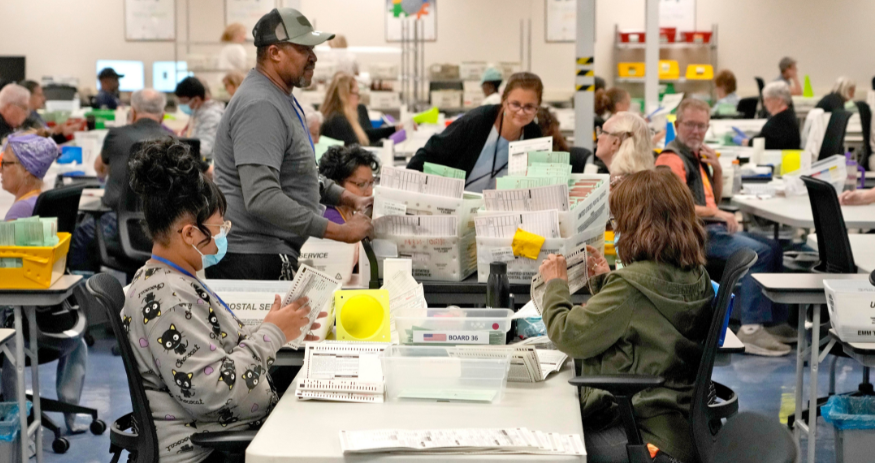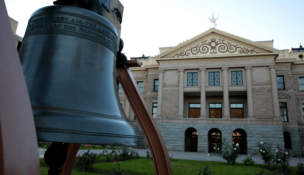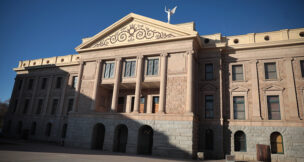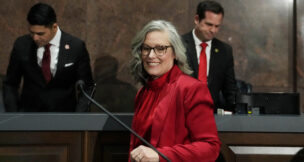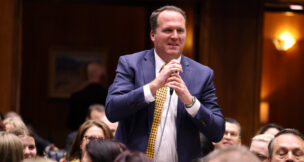Calm post-election period prompts reflection on public trust
Kiera Riley Arizona Capitol Times//November 14, 2024//
Calm post-election period prompts reflection on public trust
Kiera Riley Arizona Capitol Times//November 14, 2024//
An election reform group prepared to launch a litigation tracker to keep tabs on an anticipated surge in legal challenges to the 2024 election.
But after the presidential election yielded no widescale legal effort, and states having so far seen little promise of impending courtroom battles, the group had to pivot.
Election Overtime, a project of Election Reformers Network, sought to keep tabs on litigation expected to spring out of a close presidential race, and predicted tight contests in a handful of states, including Arizona.
The day after the election, Election Reformers Network President Kevin Johnson put out a letter noting a decision to postpone the launch of the tool designed to keep tabs on races contested in court.
Johnson wrote, “It was clear last night, there’s no overtime in this presidential race. It’s a different day than we expected, and maybe a different world.”
The presidential election sidestepped predicted legal challenges. And though contests could still emerge after Arizona’s statewide canvass on Nov. 25, those working in election spaces have so far noted a comparatively calmer post-election environment than in 2020 and 2022.
The relative quiet gave way to some reflection on how and if public trust in elections has changed since 2020 and a hope that past post-election litigation vindicated security in state election processes among the public.
“The damage that’s been done to voter confidence, the damage that, in many ways, Arizona was an epicenter for, is long-lasting,” David Becker, executive director and founder of the Center for Election Innovation and Research, said. “I’m cautiously optimistic over time that confidence will be restored. I’m hopeful that some of the really destructive ideas that were based on disinformation … melt away now that those who spread some of the disinformation about elections saw the candidates that they prefer winning in 2024.”
The post-election legal environment in 2024, both nationally and statewide, stands in stark contrast to 2020, where in Arizona alone, the presidential election brought on seven lawsuits challenging election administration and results and eventually stirred a months-long hand count audit.
And it pales to 2022, when gubernatorial candidate Kari Lake, attorney general candidate Abe Hamadeh and secretary of state candidate Mark Finchem – all Republicans – lodged lawsuits contesting the results of their elections, with allegations of some level of fraud or misconduct.
Lake and Hamadeh’s contests, and Finchem’s attempt to get out of court-ordered sanctions, were all denied review by the Arizona Supreme Court on Nov. 6. So far, no candidates have announced intent to challenge election results.
Becker said it was too early to say whether Arizona is out of the woods yet in terms of high-caliber election distrust or post-election litigation, but he hopes this cycle, as well as the recent close of election litigation in the past cycle, helps dispel unfounded claims of election fraud.
“This was always based on a lie. The Democratic Party, being out of power, did not somehow find a way to overcome the massive power of the Trump administration in 2020 and then forget how to use that power in 2024,” Becker said. “There wasn’t some grand conspiracy to have Arizona’s electors go to Trump, but to send a Democratic senator to the United States Senate. None of these conspiracy theories ever made any sense. And hopefully, people will wake up to that now.”
He noted post-election litigation in the last four years, though in some ways damaging to voter confidence, has ultimately polished the public’s understanding of the courts as a safeguard in ensuring proper election results and processes.
“The work of every single election official in Arizona has been under the scrutiny of the courts for years, and every single time it has withstood that scrutiny. Every single time, they’ve shown their work, and they’ve demonstrated their work reached the outcome as defined by the will of the voters,” Becker said.
He continued, “Arizonans, having gone through this trial by fire over the last four years, should have more confidence than ever about their election administrators, their elections process and the courts that will review it in the case of very close elections.”
Jen Wright, election attorney, said from her view, the most recent election cycle ran smoothly, though noted support from third parties could have played some role in ironing out any wrinkles.She noted in particular the party buses deployed by Turning Point USA to shuttle voters to less crowded polling places.
“Most importantly is that people had a good voting experience. Because to me, that is so critical. That’s how we restore trust,” Wright said. “More people who have bad voting experiences equals more questions and concerns about the election. Fundamentally, like whether it was through a third party assisting or not, the fact of the matter is, I really do commend the fact that it did go very smoothly on Tuesday, but I hope that going forward, it can go even smoother.”
Despite a lack of election challenges thus far, Election Reformers Network released the election litigation tracker Nov. 12, featuring a collection of nationwide litigation potentially impacting results and future procedures.
In announcing the launch, Johnson noted a host of races still remain uncalled, and election contests could still be on the table.
But he hopes litigation of past cycles, and any potential litigation in 2024, highlights for the public the distinction between what he deemed the “real results process,” or ballot counting, recounts and post-election litigation, and the “media or political centric process” characterized by race calls and projections.
“There will be elections again that are super close, there will be a narrative of misinformation that arises again in some election very soon,” Johnson said. “They need to know the difference, and they need to be ready to understand the ‘real results process’ when things are too close.”
“We should all be thinking of litigation in election results, not as an indication that things have gone awry, but as a normal part of making sure things are done right,” Johnson said.

